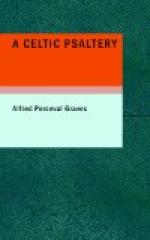“Ye are guilty of the Great Offence!
Ye have spilt the blood of innocence.”
And yet another woman said:
“O Lord Christ come to me!
Nay, no longer tarry!
With my son, home to Thee
My soul quickly carry!
O Mary great, O Mary mild,
Of God’s One Son the
Mother,
What shall I do without my child,
For I have now no other.
For Thy Son’s sake my son they slew,
Those murderers inhuman;
My sense and soul they slaughtered too,
I am but a crazy woman.
Yea! after that most piteous slaughter,
When my babe’s life ran out like
water,
The heart within my bosom hath become
A clot of blood from this day till the
Doom!”
THE KEENING OF MARY
Taken down by Patrick H. Pearse from Mary Clancy of Moycullen, who keened it with great horror in her voice, in a low sobbing recitative.
Mary. “O Peter, O Apostle,
my bright Love, hast thou found him?”
“M’ochon
agus m’ochon, O!”
Peter. “Even now in the
midst of His foemen I found Him.”
“M’ochon
agus m’ochon, O!”
Mary. “Come hither, ye
two Marys, and my bright love be keening.”
“M’ochon
agus m’ochon, O!”
The two Marys. “If
His body be not with us, sure our keene had little
meaning.”
“M’ochon
agus m’ochon, O!”
Mary. “Who is yonder stately
Man on the Tree His passion showing?”
“M’ochon
agus m’ochon, O!”
Christ. “O Mother, thine
own son, can it be thou art not knowing.”
“M’ochon
agus m’ochon, O!”
Mary. “And is that the
little son whom nine months I was bearing?”
“M’ochon
agus m’ochon, O!”
“And is
that the little son in the stall I was caring?
And is that the
little son this Mary’s breast was draining?”
“M’ochon
agus m’ochon, O!”
Christ. “Hush thee, hush thee, Mother, and be not so complaining.”
Mary. “And is this the
very hammer that struck the sharp nails thro’
thee?”
“M’ochon
agus m’ochon, O!”
“And this
the very spear that thy white side pierced and slew
thee?”
“M’ochon
agus m’ochon, O!”
“And is
that the crown of thorns that thy beauteous head is
caging?”
“M’ochon
agus m’ochon, O!”
Christ. “Hush, Mother,
for my sake thy sorrow be assuaging.”
“M’ochon
agus m’ochon, O!”
“For thy
own love’s sake thy cruel sorrow smother!”
“M’ochon
agus m’ochon, O!”
“The women
of my keening are unborn yet, little Mother!”
“M’ochon
agus m’ochon, O!”
“O woman,
why weepest thou my death that leads to pardon?”
“M’ochon
agus m’ochon, O!”
“Happy hundreds,
to-day, shall stray through Paradise Garden.”
“M’ochon
agus m’ochon, O!”




